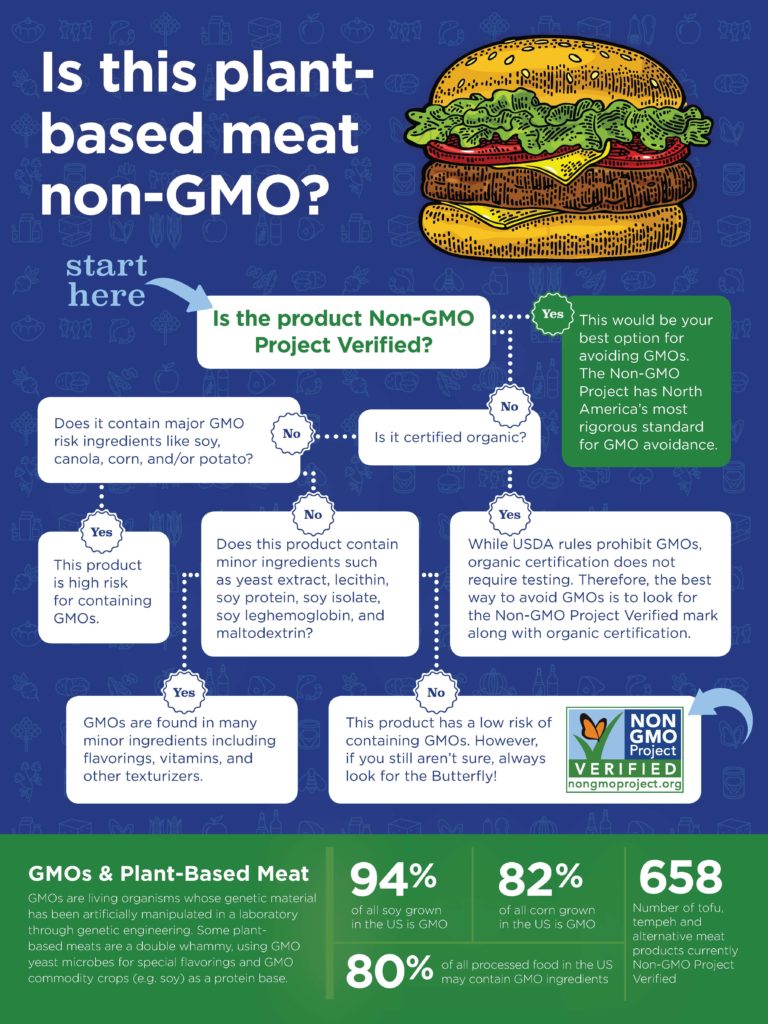In the past few years, new plant-based meat alternatives have inundated the market. These products resemble meat, but contain no actual animal tissue. They are created with plant-derived ingredients like soy or pea protein. With as many as a quarter of North American millennials describing themselves as vegetarians or vegans, and plant-based diets on the rise generally, there’s huge demand for burger-like meat alternatives. Unfortunately, for people looking to avoid both GMOs and animal-derived products, the growing popularity of these options is making this particular aisle at the grocery store more challenging to navigate.
Of course, people opt out of a meat-based diet for many reasons, including cultural beliefs, concerns about personal and planetary health, and animal welfare. “Flexitarian” people who wish to reduce the meat in their diets often struggle to find sustainable and truly nutritious proteins that also satisfy that occasional craving for a burger. Add to that a desire to avoid GMOs, and it’s a tall order. At times it may seem hopeless. If that’s you, we’ve got you covered. Check out this infographic designed to help you avoid GMOs that may be hiding in your plant-based meat ingredients list:

Why choose plant-based meat?
Plant-based meats are often touted as environmentally friendly. They can be less resource-intensive, particularly when it comes to water and land use. However, not all plant-based meats are created equal. Some products are made with GMO ingredients, many of which are engineered for herbicide resistance. Since GMOs were introduced in the 1990s, the use of toxic herbicides like glyphosate (the active ingredient in Monsanto’s infamous RoundUp) “has increased 16-fold.” In 2015, the World Health Organization’s International Agency for Research on Cancer (IARC) identified glyphosate as a probable human carcinogen, and there are literally hundreds of active lawsuits about the health impacts of widespread use of this toxic agricultural input.
It’s no surprise then that GMO crops generally have a high environmental footprint. Most GMOs are commodity crops (such as soy, canola, and corn) planted in “monocultures”—vast swaths of agricultural land dedicated to a single crop. Monocultures have been linked to reduced biodiversity, soil degradation, the overapplication of synthetic fertilizers, increased pesticide use, and heavy greenhouse gas emissions contributing to climate change.
Perhaps even more disturbingly, new genetic engineering techniques are also showing up in the plant-based meat space. These pose additional risks to the consumer, with some companies capitalizing on their novelty to avoid labeling their products as GMO. Don’t be fooled: new GMOs are still GMOs, and none of them are allowed in Non-GMO Project Verified products. If you choose plant-based meat for environmental reasons, make sure your choice is actually helping Mother Earth by going non-GMO and organic whenever possible!
How do I avoid GMOs in my plant-based meat?
Look for the Butterfly! There are hundreds of Non-GMO Project Verified meat alternatives to choose from. By choosing Non-GMO Project Verified plant-based meat choices, you can be sure you’re shopping your values and doing your part for the planet. When you buy Non-GMO Project Verified products you’re not just avoiding GMOs—you’re voting for a better future.
This content was originally posted on 10/11/2019.
